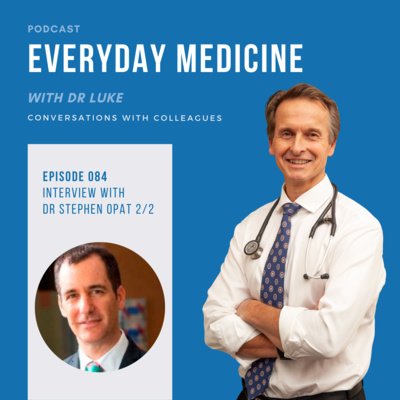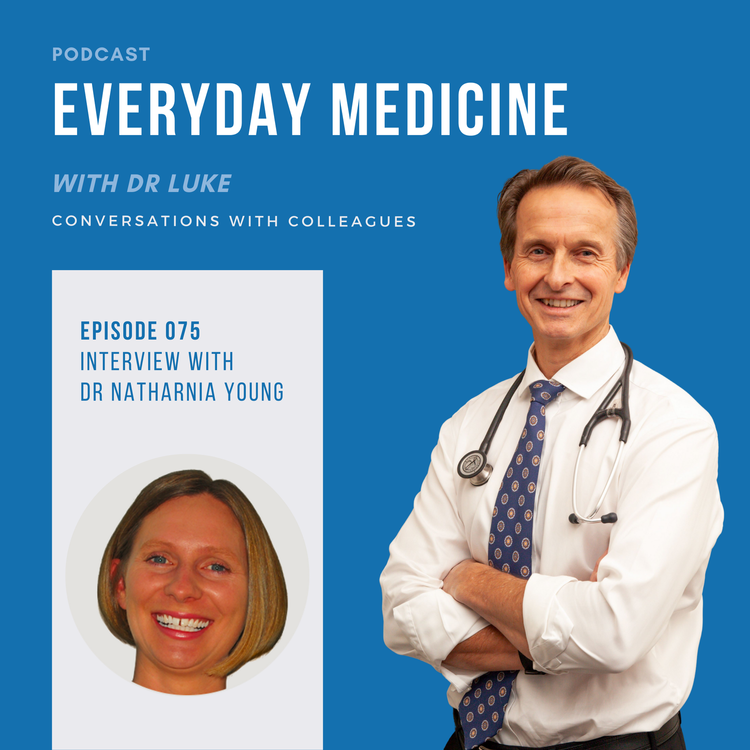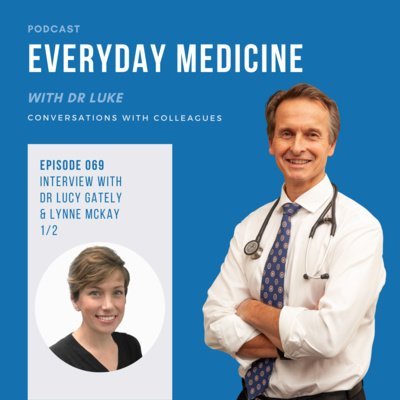Everyday Medicine by Dr Luke Crantock
Conversations with colleagues providing helpful ideas and advice in healthcare
Special Episode 11. Anti Virals for COVID-19 with Dr Alex Tai
As case numbers and deaths continue to climb from Covid-19 infection and its many variants, two antiviral drugs have entered the market and are now available on the Australian PBS with specific prescription criteria to be met. So, what are they and what do they do?
Episode 84. Lymphoma with Professor Stephen Opat (Part 2)
Lymphoma is a clonal neoplastic proliferation of lymphoid cells (B cells, T cells and NK cells) and is the sixth most common malignancy reported in this country which makes it the most common hematologic malignancy with over 5000 cases diagnosed each year in Australia putting lifetime risk at 1 in 50.
Episode 83. Lymphoma with Professor Stephen Opat (Part 1)
Lymphoma is a clonal neoplastic proliferation of lymphoid cells (B cells, T cells and NK cells) and is the sixth most common malignancy reported in this country which makes it the most common hematologic malignancy with over 5000 cases diagnosed each year in Australia putting lifetime risk at 1 in 50.
There are over 70 different types of lymphoma which are divided into 2 main groups: Hodgkin's lymphoma accounts for 10% of cases and non-Hodgkin's lymphoma accounts for 90% of cases.
Hodgkin's lymphoma named after Thomas Hodgkin (1832) is more common in men, and tends to occur at a younger age than non-Hodgkin's lymphoma with a bimodal age distribution but the average age at diagnosis of 39 years and involves lymph nodes frequently on just one side of the body usually above the diaphragm. The tumour cell is referred to as the Reed Sternberg cell which is a bi or multi-nucleated B cell comprising characteristically just 1% of the lymphoma mass. Just to make this nomenclature interesting there is classic Hodgkins which make up about 95 % of cases and of which nodular sclerosing comprises about 70 % and mixed cellularity 20-25 % and non-classic Hodgkins is characterised by nodular lymphocytic predominant pathology.
Episode 82. Advances in Anti-ageing Medicine with Dr John Levin
Dr John Levin practices antiaging medicine and joins this podcast to discuss his practical approach to treatment. As John laments antiaging medicine is not taught in medical school yet he believes the science of anti-ageing holds the key to significantly reducing human suffering and improving health span. Whilst the average human life span continues to increase and modern medicine more efficiently tackles diseases, the science of anti-ageing looks at mechanisms leading to cell degeneration and decay and seeks ways to regenerate cell health and thereby delay the many diseases associated with ageing.
Episode 81. Polycystic ovary syndrome (PCOS) with Dr Mei Cheah
PCOS is the most common endocrinopathy of reproductive age women affecting about 1 in 10. Characteristically the condition presents with menstrual irregularity, excess androgens, and polycystic ovarian morphology. More common in women with a family history and type 2 diabetes the condition is associated with obesity, infertility, pregnancy complications and metabolic derangements as well as a number of psychological consequences.
In this podcast we have a conversation with obstetrician and gynaecologist Dr Mei Cheah founder of Create Health a leading group of specialists in women's health creating visions for a healthy future, better well-being, and more informed patients. Create Health aims to deliver exceptional care across obstetrics, gynaecology, reproductive endocrinology, minimally invasive surgery, fertility and IVF plus allied and complimentary health services. We look forward to exploring the practical aspects of this diagnosis further with you.
Episode 79. Investigations in Rheumatology with Dr Andrew Teichtahl
In this episode we explore investigations in rheumatology - What is helpful and what is not?A clinician faced with a patient complaining of myalgias and generalised rheumatic aches may be tempted to order a host of immunological and inflammatory tests whilst also assessing multiple other differential diagnoses that need considering. There are a host of serological tests available each with different degrees of sensitivity and specificity for rheumatological conditions, furthermore it is important to understand the sensitivity (ability to rule out condition) and specificity (ability to rule condition in) is applied to such tests. Fortunately, we had the opportunity to have a conversation with Dr Andrew Teichtahl who provides excellent clarification on the subject.
Episode 77. The Microbiome with Dr Mark Morrison
Trillions of microbes are living in and on us, a thriving ecosystem of bacteria, viruses, archaea and fungi. Collectively these microbes form the human microbiome and this microbiome appears to play a key role in many aspects of health, crowding out harmful microbial invaders, breaking down fibrous food into digestible compounds and producing some essential vitamins such as B12 and vitamin K. New research is exploring the relationship between the gut microbiome and immunogenicity, autoimmune inflammatory diseases, neoplasia and brain development and is searching ways to correct dysbiosis.
Episode 76. Breast Cancer with Dr Corinne Ooi
Breast cancer affects 1 in 7 women and remains the most diagnosed cancer in Australia with 57 new cases diagnosed each day, 1000 new cases per year and tragically 2000 deaths annually. Men are not excluded, for every 100 breast cancers one is diagnosed in a male. Genetic links for breast cancer such as the BRCA 1 and 2 genes receive significant attention but account for only 5% of total cases,75% of patients have no family history and additionally 75% of breast cancers are diagnosed in patients 50 years or older. Multiple risk factors including family history, young age of menarche and older age of menopause are frequently cited but less well known is the association with obesity which is responsible for up to 8% of all breast cancers. It is estimated that 1: in 4 cases of all breast cancer may be prevented with attention to known modifiable risk factors. Breastfeeding and earlier age of pregnancy are both protective factors.
Episode 75. Urinary Incontinence in Women with Dr Natharnia Young
Dr Natharnia Young is a leading urogynaecologist servicing South Eastern Melbourne’s suburbs and joins this conversation to discuss urinary incontinence in women, a condition associated with significant personal and social stigmatisation and affecting up to 1:2 women over the age of 70.
Episode 74. Sports Medicine and Supplements with Dr Peter Brukner
Dr Peter Brukner OAM is Professor of Sports Medicine at the Latrobe Sport and Exercise Medicine Research Centre and is one of Australia’s most respected and best-known specialist sports physicians with a wide breadth of knowledge of the subject. He has extensive experience, having enjoyed a stellar career with elite sports teams and Olympians over multiple decades in his professional capacity.
Episode 73. Sports Medicine and Low Carbohydrate Diet with Dr Peter Brukner
Dr Peter Brukner OAM is Professor of Sports Medicine at the Latrobe Sport and Exercise Medicine Research Centre at Latrobe University and is one of Australia’s most respected and best known specialist sports physicians. He has a deep breadth of knowledge and experience and was a founding partner at the Olympic Sports Medicine Centre in Melbourne as well as a sports physician to the Collingwood and Melbourne AFL clubs, Liverpool Football Club and has served as team doctor to the Australian cricket team, Socceroos and several Olympic teams. He has authored multiple best-selling books on sports medicine and more recently has become interested in the important relationship between lifestyle and health and after determining that he was pre-diabetic he embarked on a low carbohydrate ketogenic style diet. He has subsequently become a strong advocate of the low carbohydrate diet both in managing a healthy BMI and avoiding development of the metabolic syndrome and all its consequent health effects and authored the very popular and best-selling book A Fat Lot of Good. He energetically has also established the not for profit campaign Sugar By Half. He joins us today to discuss his experience and journey to a low carbohydrate diet and how such an approach may be highly beneficial to athletes of both amateur and elite persuasions. Please enjoy this podcast.
Special Episode 9. New Vaccines with Professor Dale Godfrey
The Peter Doherty Institute was the first Australian laboratory to establish a Covid 19 PCR test and diagnose the first SARS- Cov 2 infection on Australian shores, its research scientist is heavily involved in developing novel diagnostic tools applied across many areas of medical science and the institute plays a key leadership role in advising state and federal government on best medical practice. It’s no great surprise therefore that we have learned of their ground-breaking development of a new subunit Covid 19 vaccine utilising the receptor binding domain at the tip of the virus’s spike proteins. This is the region responsible for virus attachment and infection and for eliciting over 90% of neutralising antibodies following SARS Cov-2 infection. Parallel with the subunit vaccine development, another Melbourne group – the Monash Institute of Pharmaceutical Sciences has developed a similar vaccine but using mRNA technology copying the virus’s genetic sequence that codes for the receptor binding domain.
Episode 72. Breaking Bad News and Admitting Error with Dr Bill Shearer and Dr Alan Saunder
Delivering hard news to a patient or their relatives and admitting error can be one of the most difficult duties encountered by a doctor. Significant effort is now spent in teaching young training doctors techniques and strategies to avoid miscommunication and uncertainty in undertaking this complicated task whilst also remaining emotionally engaged and empathetic to their situation.
Episode 71. Chronic Pain with Dr Stephen Nutter
Chronic pain affects about 1 in 5 people in Australia and is a common reason for patients to see their doctor and to seek treatment. As patients seek ever increasingly strong pharmacological therapies they may become increasingly depressed, fatigued and dislocated from society.
Episode 70. Familial Cancer Screen with Dr Lucy Gately - Part 2
Genetic testing for cancer is important for a small number of families at increased risk due to the inheritance of genetic mutations. Most commonly this involves the inheritance of breast cancer genes such as the BRCA 1 and 2 or colorectal cancer genes such as the Lynch syndrome genes. Although these only represent a small percentage of total cancers reported there is significant public interest in these syndromes.
Episode 69. Familial Cancer Screening with Dr Lucy Gately and Lynne McKay - Part 1
In the context of family cancer screening, genetic testing looks for specific inherited changes or variants in a person’s genes which may predispose them to an increased risk of developing a neoplasm. Harmful variants in some genes are known to be associated with an increased risk of developing specific cancers such as mutations to the BRCA 1 and 2 genes associated with breast and ovarian cancer and the Lynch genes associated with colorectal and endometrial cancer.
Episode 68. The Ketogenic Diet with Dr Rod Tayler
The ketogenic diet has recently become popular as an effective dietary approach to weight loss. The diet restricts carbohydrates to just 5-10% of total calories and relies on caloric intake from fats (55-60%) and proteins (30-35%) forcing metabolism to shift from gluconeogenesis to ketogenesis with the production of acetoacetate, beta-hydroxybutyrate and acetone – ketone bodies – as the usable energy source. People adopting this diet report a significant reduction in hunger, increase in energy, clarity of thought and reduction in chronic inflammatory conditions. Some are concerned the diet is difficult to maintain long term and may be risky in patients that are diabetic and in those with chronic kidney disease.
Episode 67. Back Pain with Dr Max Kupershmidt
Before proceeding, we apologise for the audio quality in this week's episode. Unfortunately, we experienced some technical difficulties and we will endeavour to resolve these problems in future episodes of Everyday Medicine.
Episode 66. Diabetic Foot with Dr Ming Yii
Diabetic foot is the name given to the condition commonly experienced by people with diabetic peripheral neuropathy and results in an insensitive and often deformed foot. Found in both type I and type II diabetic patients (of which there are 1.8 million living in Australia-one new diagnosis is made every 5 minutes), even minor trauma in the diabetic foot may lead to the development of an ulcer. The combination of impaired vascular supply from micro and macro vascular disease and neuropathy presents real challenges for healing. Consequently, diabetic foot ulcer is a major event in 85% of subsequent amputations and is the cause of 20% of hospital admissions related to diabetes. Ten to 15% of diabetic foot ulcers fail to heal and of these, 25% lead to an amputation. In one study up to 50% of diabetic patients undergoing amputation were dead within 2 years. Failure to be seen and managed by medical attendants more than 6 weeks after developing an ulcer in a diabetic foot vastly increases the amputation risk however just one year after appropriate vascular surgical management, between 70 and 90% of limbs will be saved from amputation. Furthermore, one year after vascular intervention up to 60% of diabetic foot ulcers are healed, highlighting the importance of vascular surgical expertise early in the management of the diabetic foot.
Episode 65. Renal Impairment with Dr Tony Amin
It is common in clinical practice to identify patients with impaired renal function as determined by diminished glomerular filtration rate and elevated creatinine. The decision to undertake thorough work-up and investigation of such patients or to observe and monitor, removing any potential offending nephrotoxic agent, is a clinical problem we address in this podcast with expert nephrologist Dr Tony Amin, who considers:




















